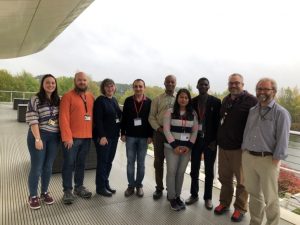CONNECTED training: a massive opportunity for our career development
This blog was written by Mr. John Oladokun, Mr. Mohamad Halabi and Ms. Parinda Barua, three members of the CONNECTED Network, who successfully applied for CONNECTED Training Voucher funding

From L-R: Mohamad Halabi, Parinda Barua and John Oladokun at a practical session on the use of test plants as a biological tool for plant virus indexing, inside the glasshouse of Fera Science Limited with Stephen Forde (2nd from Left)
If you are an early career researcher (ECR) looking for a group to
- discuss
- share
- learn, and
- expand your collaboration network on how to address the challenges of vector-borne plant viruses,
then the CONNECTED Network should be your best choice.
We three successfully applied and were privileged to be selected individually for the first round of the CONNECTED Training Voucher scheme – up to £3,000 worth of training. This allowed us to undergo three weeks intensive training in October 2019 at Fera Science Limited, formerly the Food and Environment Research Agency, a joint venture based in the United Kingdom (UK).
Mr. John Oladokun and Mohamad Halabi are both Research Scholars in the Department of Plant Pathology, Assam Agricultural University, Jorhat, India – from Nigeria and Syria respectively, while Ms. Parinda Barua (Indian nationality) is a Junior Scientist of The Regional Agricultural Research Station (RARS) under the same university.
As ECRs seeking more knowledge to contribute significantly to ongoing research on plant viral diseases; especially those vectored by insects, this CONNECTED training opportunity has added to our human capacity development.
During our visit to UK, our training focused on
- general detection and diagnostic methods for routine samples received in a plant health clinic, such as the use of ELISA and biological approaches
- the use of qPCR and LAMP methods for detection of plant viruses
- introduction to detection of plant viruses using high throughput sequencing techniques (HTS)
- current diagnostics approaches in use by many developing countries such as Nanopore (MinION) and Illumina sequencing (MiSeq system) technologies
- molecular data analyses, interpretation and effective scientific reporting skills
- a complete tour and briefing of all departmental activities (Bacteriology, Mycology, Nematology and Entomology) working alongside the Virology Unit of Fera Science Limited.

Trio on an invited visit to establish new collaboration with Dr. Ville Friman (University of York, 3rd from Left) and Dr. John Elphinstone (Bacteriologist at Fera Science Limited, 2nd from right)
This training received has not only improved our career development skills in diagnostics and detection, but contributed to the creation of a sustainable network of international scientists addressing the challenges of plant viruses. Our visit to the Institute has forged new links and consolidated existing ones for collaboration in future research.
Through the support of our hosts (Dr. Adrian Fox, Dr. Ian Adams and Prof. Neil Boonham), their colleagues and Dr. John Elphinstone (Bacteriologist at Fera Science Limited) we have benefited from the exchange of ideas, mutual enrichment and linkage between us, and our experiences have opened a free door to collaborate in an ongoing project in the continent of Asia with Dr. Ville Friman from The University of York, UK.
Sharing our learning
Above all, as a team of three, what we have learnt during our training is greatly useful for more than twenty colleagues working in the same field, which we have chosen in our present home country lab. And so we shall give back by concurrently organising in-house bi-monthly training for colleagues within and outside the department. We will use the available facilities at our reach, especially those we have newly acquired (e.g. LAMP, qPCR) but which have not previously been in use due to lack of experienced users to operate them. With our first hand training on these techniques we shall henceforth put the equipment into use.

The hosts (Prof. Neil Boonham and Dr. Adrian Fox, 1st and 2nd from right) with colleagues (L-R : Ines Vazquez, Ben Barret, Sioban Ostoja-Starzewska, Stephen Forde- 5th from left) joining Mohamad Halabi, Parinda Barua and John Oladokun during the end of training farewell at Fera Science Limited balcony
Also, having undergone training on how to take decisions on routine sample received in a plant health clinic, we shall henceforth contribute meaningfully to our home institution plant health mobile clinic, in diagnosing samples received from growers around our state and beyond for improved decision-making. We shall continue to use our different social media networks’ strength to share and transfer useful information gained to the general public by opening discussions that will provoke healthy debates and useful contributions.
Finally, we went, we have learnt, we have connected, and we are back in our home country … and still connecting to stay CONNECTED.
Our appreciation goes to the funding agency of CONNECTED and the network team for this great opportunity. Many thanks to our UK hosts who believed in our capacity to be trained under their guidance with their permission to utilise the Institute facilities.
We cannot over-state the thanks we wish to express to all the staff who we encountered on a daily basis during the course of the training, for their warmth hospitality, support and guidance during our stay.
